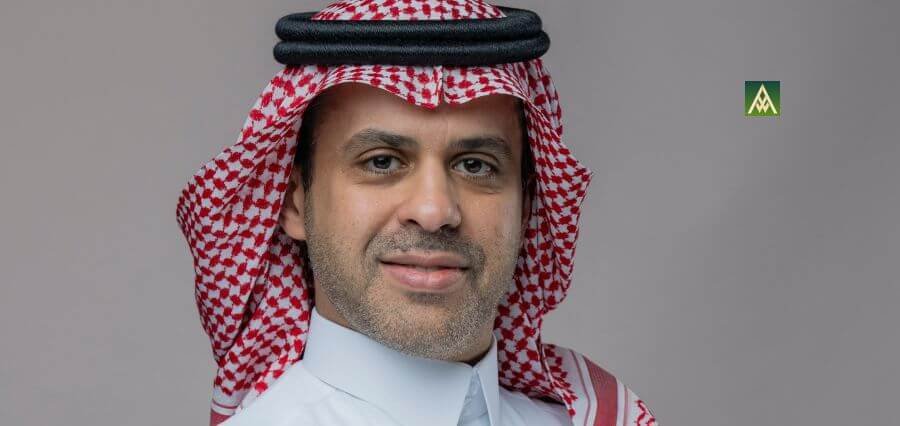In an era of unprecedented global connectivity, airports face a monumental challenge: how to transform from mere transit points into thriving commercial hubs while delivering exceptional passenger experiences. This complex puzzle has left many aviation authorities scrambling for solutions. Meet Abdulaziz Al-Asaker, the visionary Chief Commercial Officer of Riyadh Airports Company (RAC), who is rewriting the playbook for airport management and commercial success.
“Innovation is our compass, and passenger satisfaction is our destination,” Abdulaziz asserts, summarizing the philosophy that has propelled King Khalid International Airport (KKIA) into the spotlight of global aviation.
Since joining RAC in 2018, he has been the driving force behind KKIA’s remarkable metamorphosis. His journey from Product Director to CCO in just three years speaks volumes about his ability to manage the complex aviation industry and deliver results.
Abdulaziz’s approach is multifaceted, focusing on diversifying revenue streams while simultaneously enhancing the traveller’s journey through the airport. His strategies, informed by an Executive MBA and industry certifications, have not only boosted KKIA’s commercial performance but have also set new standards for passenger satisfaction.
Under his leadership, KKIA has become an example of what’s possible when innovation meets dedication. His work aligns perfectly with Saudi Arabia’s Vision 2030, positioning the airport as a crucial component in the nation’s ambitious plans for economic diversification and growth.
Let us learn more about his journey:
Revolutionary Excellence in Aviation
Established in 2016 as part of Saudi Arabia’s aviation privatization program, Riyadh Airports Company (RAC) manages and operates King Khalid International Airport (KKIA) in Riyadh. RAC is dedicated to maintaining and upgrading KKIA’s infrastructure, providing attractive services, and a world-class experience for travellers, cargo customers, and partners through safe and efficient operations.
RAC collaborates closely with local and global partners and stakeholders to exceed customer expectations and aims to be a global industry leader. The company values each employee’s contribution, obeying five core values to serve clients and partners to the highest standards. This commitment affirms that every customer leaves with a remarkable experience.
Leveraging Assorted Expertise
Abdulaziz Al-Asaker; Chief Commercial Officer (CCO) of Riyadh Airports Company (RAC), brings extensive experience from the insurance, telecommunications, banking, and aviation sectors to his role. His background has equipped him with a well-rounded skill set essential for managing King Khalid International Airport’s (KKIA) commercial landscape.
In previous roles, Al-Asaker developed expertise in financial management, customer experience, loyalty programs, corporate communication, and business development strategies. This diverse experience allows him to proactively identify and mitigate challenges, confirming precision and effectiveness in the aviation industry.
His knowledge of risk management from the insurance sector and customer loyalty insights from telecommunications and banking help create impactful passenger experiences at KKIA, aligning with RAC’s vision of exceeding customer expectations.
Transforming Commercial Partnerships
Since 2019, Riyadh Airports Company has developed deeper, more strategic commercial partnerships, driving significant growth beyond passenger increases.
Collaborating closely with key retail and commercial partners, RAC has set clear KPIs and conducts regular business reviews, boosting sales penetration, average transaction value (ATV), and passenger spending. Strengthened ties with major international players also result in greater business performance and passenger experiences.
Looking ahead, RAC’s ambitious expansion plans include the T1/T2 Link and pier extensions for Terminals 1 and 4, increasing commercial space and capacity. By maintaining an agile approach, RAC confirms that capacity is in line with passenger growth and evolving demographics, positioning the company for long-term success and achieving national transport strategy goals.
Expanding for Vision 2030
Affiliated with Vision 2030, Riyadh Airports Company has positioned King Khalid International Airport to meet increasing traveller numbers and support Riyadh’s future as a global hub. Refurbishing Terminals 1 and 2 will increase capacity by 40%, accommodating 14 million passengers annually.
The upgrades focus on improving the passenger experience with modern, open spaces, ample seating, and strategically placed commercial areas, including walk-through duty-free sections. RAC is committed to continuous improvement and future expansions to keep pace with Riyadh’s evolving needs.
Transfiguring Aviation and Tourism
Saudi Arabia’s Vision 2030 sets bold passenger traffic goals, reflecting the Kingdom’s commitment to economic diversification and tourism growth. This strategy leverages the Kingdom’s unique strengths—its central role in the Arab and Islamic worlds, strong investment potential, and strategic location.
Vision 2030 aims to diversify the economy, empower citizens, attract investors, and position Saudi Arabia as a global leader in industries, including aviation. Key to this is the development of major tourist hubs such as Riyadh, Neom, and Jeddah.
Riyadh, with projects like “Six Flags Qiddiya” and events such as the Riyadh Season and the AFC Asian Cup 2027, is set to enhance its status as a major tourist destination. The Diriyah Gate project, home to the world’s largest heritage site, will further attract visitors with its cultural and historical significance.
Saudi Arabia’s goals are not just about increasing passenger numbers but also about redefining the Kingdom’s global tourism profile and showcasing its rich culture, traditions, and innovations.
Espousal Inclusivity and Excellence
At King Khalid International Airport, leadership is anchored in principles of inclusivity and equality, which are integral to daily operations. The organization creates an environment where every team member feels valued and respected, which is critical for nurturing diverse ideas and innovative solutions. This inclusive approach not only augments decision-making but also improves the passenger experience.
KKIA leaders set a practical example by demonstrating how inclusivity and respect translate into effective teamwork and exceptional service. This modelling of values provides an agenda for junior colleagues to follow, confirming that standards of excellence are upheld and expanded.
Moreover, KKIA is committed to the continuous development of its human resources through education and training programs. This investment in the workforce drives both individual and collective success, positioning KKIA as a leader in delivering superior services and contributing to the growth of Saudi Arabia’s tourism and business sectors.
Driving Business Success
At King Khalid International Airport, effective communication is pivotal to achieving business goals. The organization’s communication strategies are aligned around three key objectives:
- Transparency and Collaboration: KKIA emphasizes open and clear communication throughout the organization, ensuring that every team member understands how their contributions impact broader objectives such as sales, customer service, and overall success.
- KPIs and Measurement: The airport sets specific performance indicators (KPIs) for communication initiatives and regularly evaluates their effectiveness. This approach allows KKIA to refine strategies and ensure they support business objectives.
- Feedback and Flexibility: KKIA values input from employees, partners, and customers, using feedback to fine-tune communication strategies and adapt to the evolving business environment.
Saudi Arabia’s Vision 2030
Saudi Arabia’s Vision 2030 aims to attract 150 million tourists by 2030, marking a significant shift from 2019 figures predominantly influenced by religious tourism. To achieve this, the Kingdom has introduced substantial investments in infrastructure and improved visa procedures. In this vision, KKIA plays a critical role by:
- Simplifying Travel: Introducing online tourist visas obtainable in minutes on mobile devices, including biometric authentication.
- Providing an Attractive Passenger Experience: Upgrading terminals and infrastructure, including self-check-in options, to ensure a stress-free journey.
- Expanding Connectivity: Prioritizing Eastward Connections, welcoming 10 new airlines, including 5 from China, and introducing nine new destinations like Beijing and Shanghai. The “Welcome Chinese Certification” highlights the commitment to attracting Chinese tourists.
These strategies have led to impressive results. From January to May 2024, KKIA saw a 15% increase in international passengers compared to the previous year, and on Aug 1, 2024, a new record was set with 131,000 passengers and 903 flights on Aug 13.
Looking ahead, KKIA remains committed to its growth strategies, focusing on passenger growth and aiming to connect Riyadh to the world while setting new standards for excellence in the aviation industry.
Redefines Duty-Free Shopping and F&B Offerings
At KKIA, duty-free shopping, retail, and F&B services are being redefined to meet passengers’ unique travel needs. With a curated selection of local treasures and international brands, the airport ensures a diverse and satisfying shopping experience that drives revenue growth.
- Enhanced Customer Satisfaction: A mix of familiar favourites and local discoveries creates a more enjoyable shopping experience.
- New Standard in Design: Over 480 brands are showcased in a setting inspired by Saudi tradition and modernity.
Key personalized offerings include:
- Local Delights: Saudi-made food products, including 10 different date varieties.
- Global Preferences: Foreign treats tailored to customer preferences.
- Travel Essentials: Conveniently stocked travel essentials are available at the cashier queuing area.
- Diverse Offerings: A variety of F&B and retail brands, including EL&N, NERO Coffee, Starbucks, and Wolf Gang, as well as popular local brands like Half Million and Camel Step.
These enhancements are set to elevate the customer experience at KKIA’s new terminals.
Future of Travel Retail
The future of travel retail at KKIA promises an exciting evolution. The airport is committed to creating seamless passenger journeys by integrating retail spaces with essential services, offering a blend of global luxury and Saudi heritage for a distinctive shopping experience.
Technological advancements like touchless payment systems, QR codes, and mobile apps will streamline the shopping process and enhance safety. Data analytics will provide insights into passenger preferences, allowing for tailored offerings.
Sustainability is a key focus, with efforts to reduce plastic waste, promote reusable packaging, and support local artisans. Collaboration with airlines will ensure retail offerings align with flight schedules and passenger demographics.
As Saudi Arabia’s aviation landscape evolves, KKIA aims to redefine the travel experience through innovation, passenger-centricity, technology, and sustainability.




